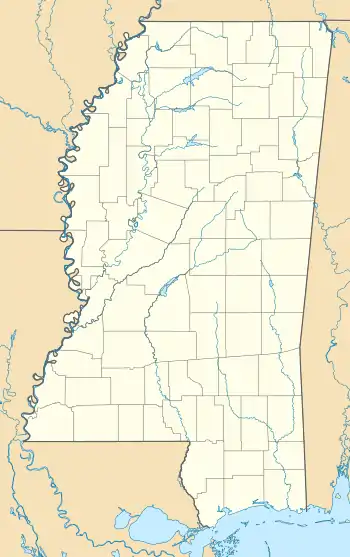Jackson Greyhound Bus Station | |
 Greyhound Bus Station, Jackson Mississippi, December 1939 (MDAH photo) | |
 Jackson Greyhound Bus Station Location in Mississippi  Jackson Greyhound Bus Station Location in United States | |
| Location | 219 N. Lamar St., Jackson, Mississippi |
|---|---|
| Coordinates | 32°18′06.6″N 90°11′08.2″W / 32.301833°N 90.185611°W |
| Built | 1938 |
| Architect | W.S. Arrasmith or Mahan & Van Powell |
| Architectural style | Streamline moderne |
| Restored | 1989 |
| Restored by | Robert Parker Adams |
| Part of | Farish Street Neighborhood Historic District (ID80002245) |
| Designated CP | March 13, 1980 |
The Greyhound Bus Station at 219 N. Lamar St., Jackson, Mississippi, was the site of many arrests during the May 1961 Freedom Rides of the Civil Rights Movement. The Art Deco building has been preserved and currently functions as an architect's office.
Construction
In 1937, Greyhound Lines contracted for a new bus station in Jackson, Mississippi. Incorporating a streamlined style and vertical, illuminated "Greyhound" marquee, it is unique for its structural glass exterior. When operating as a bus station, the building included a coffeeshop and bathing facilities.[1] Sources differ on whether the station is the work of W.S. Arrasmith[1] or George Mahan Jr. and Nowland Van Powell of Memphis, Tennessee.[2]
Freedom Ride to Jackson, Mississippi
Freedom Riders were civil rights activists who rode interstate buses into the segregated southern United States, in 1961 and subsequent years, to challenge the non-enforcement of the United States Supreme Court decisions which had ruled segregated public buses to be unconstitutional.
Jackson, Mississippi was planned as a stop on the Freedom Rides of May 1961. On May 28 that year, nine Freedom Riders arrived at the Greyhound Bus Station. Other groups had arrived four days earlier. Upon arrival, riders would seek access to facilities denied to non-whites, such as waiting areas designated "Whites Only." During the next four months, 329 people were arrested in the town, half of them black and half of them white, with a quarter being women.[1] Part of the Freedom Riders' strategy was to overwhelm Jackson city jails by refusing bail. When Jackson's jails were full of riders arrested at Trailways and Greyhound facilities, Freedom Riders were transferred to Parchman penitentiary.[3]
Preservation
.jpg.webp)
Located within the southeast boundary of the Farish Street Neighborhood Historic District, the building was acquired by architect Robert Parker Adams in 1988 whose firm restored the station's exterior and interior.[4] The state of Mississippi has placed an explanatory marker on the site.[5]
See also
- Farish Street Neighborhood Historic District, Jackson, Mississippi
References
- 1 2 3 "Greyhound Bus Station Historical Marker". Retrieved 4 April 2018.
The Jackson station was built from 1937-1938. This is the only station that William Strudwick Arrasmith designed with a structural glass faced exterior. Originally, the interior had a coffee shop with a horseshoe-shaped counter. The men's room had a shower, while the women's room had a bath tub.
- ↑ "Greyhound Bus Station, December 22, 1939". Flickr. Retrieved 5 April 2018.
George Mahan Jr. - Nowland Van Powell Architects, Memphis Tenn.
- ↑ Arsenault, Raymond (2006). Freedom Riders: 1961 and the Struggle for Racial Justice. Oxford University Press. pp. 325. ISBN 9780199755813.
Parchman prison restaurant.
- ↑ "Tour "The Dog"". www.robertparkeradams.com. Retrieved 4 April 2018.
- ↑ "Civil Rights: The Mississippi Freedom Trail". Visit Mississippi. 14 September 2017. Retrieved 4 April 2018.
External links
- Greyhound Bus Station - Mississippi Freedom Trail in the Historical Marker Database
- Tour of restored building, by Robert Parker Adams, Architect
- Mississippi Freedom Trail
- Mississippi Historic Markers
- Google Map of Farish Street Neighborhood Historic District
- Photo of historic plaque